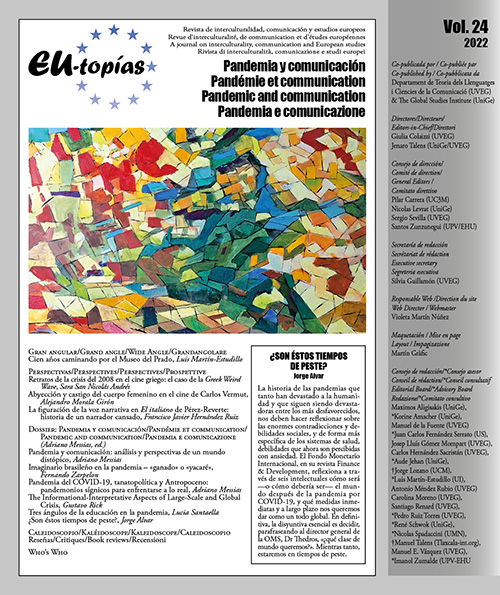The figuration of the narrative voice in El italiano by Arturo Pérez Reverte: story of a tired narrator
DOI:
https://doi.org/10.7203/eutopias.24.23677Keywords:
Pérez-Reverte, narrator, postmodernity Abstract
Abstract
This article explores, on the one hand, the continuity of some of the main motifs of Arturo Pérez Reverte’s poetics in the author’s latest novel, El italiano (2021). On the other hand, it highlights the novel use (with respect to his previous works) that Pérez-Reverte makes of the figuration of the narrative voice itself within the novel in order to shift the character of his «tired» (that is, bitterly lucid and disillusioned) heroes to the narrative voice in order to preserve, in the novel, the remains of the classical hero and his epic. Thus it maintains a coherent correlation with the «discourse from the ruins» used in earlier works, in which, though, such discourse was produced from the character’s memory and not from the figurative narrative voice.
 Downloads
Downloads
 References
References
Alemany, Luis. «Pérez-Reverte: «El héroe que se vende ahora, el de la ONG que salva ballenas, no tiene nada que ver con la realidad». Publicado en El mundo, edición digital, 2021.
Bauman, Zygmunt. Modernidad Líquida. México: Fondo de Cultura Económica, 2015.
Belmonte Serrano, José y López de Abiada, José Manuel (eds.). Sobre héroes y libros. La obra narrativa y periodística de Arturo Pérez-Reverte. Murcia: Nausícaä, 2003.
De Cózar, Rafael. «El héroe y sus atributos en la narrativa de Pérez-Reverte». Sobre héroes y libros. La obra narrativa y periodística de Arturo Pérez-Reverte. Eds. José Belmote Serrano y José Manuel López de Abiada. Murcia: Nausícaä, 2003, pp. 45-59.
Derrida, Jacques .De la gramatología. Buenos Aires: Siglo XXI, 1971.
Dotras, Ana M. La novela española de metaficción. Madrid: Ediciones Júcar,1994.
Garrido Domínguez, Antonio. El texto narrativo. Madrid: Editorial Síntesis, 1996.
Genette, Gérard . Figuras III. Barcelona: Lumen,1989.
Hernández Ruiz, Francisco Javier. Imagen y narración: el discurso sobre la guerra en Territorio comanche, El pintor de batallas y El francotirador paciente de Arturo Pérez-Reverte. Valencia: Universidad de Valencia, https://roderic.uv.es/handle/10550/78093.
Homero. Odisea. Barcelona: Blackie Books., 2021.
Lakunza, Rosana. «Arturo Pérez-Reverte: «Hay una patria que nunca me engaña: el Mediterráneo». Publicado en Diario de Noticias de Álava, edición digital,2021.
Lyon, David. Postmodernidad. Madrid: Alianza Editorial, 2000.
Muñoz Ogáyar, Jorge. Y al séptimo día descansó. Arturo Pérez-Reverte, creador de universos postmodernos. Murcia: Nausícaä, 2009.
Nietzsche, Friedrich. Sobre verdad y mentira en sentido extramoral. Valencia: Diálogo, 2003.
Orejas, Francisco G. La metaficción en la novela española contemporánea. Madrid: Arco/Libros, 2003.
Pérez-Reverte, Arturo: Territorio comanche. Madrid: Alfaguara,1994.
— El sol de Breda. Madrid: Alfaguara, 1998.
— El pintor de batallas. Madrid: Alfaguara, 2006.
— El francotirador paciente. Madrid: Alfaguara, 2013.
— Hombres buenos. Madrid: Alfaguara, 2015.
— Sidi. Un relato de frontera. Madrid: Alfaguara,2019.
— El italiano. Madrid: Alfaguara, 2021.
— [Conferencia]: «La cobertura periodística del siglo XX.» Conferencia impartida ante estudiantes de Periodismo y Medios de información en el Instituto Tecnológico y de Estudios Superiores de Monterrey. 18 de marzo de 1999, Monterrey, México. Cátedra Alfonso Reyes. Publicada en 2014. https://www.youtube.com/watch?v=sN6bl7BecfM
Picó, Josep (comp.). Modernidad y postmodernidad. Madrid: Alianza Editorial, 1994.
Vattimo, Gianni. La sociedad transparente. Barcelona: Ediciones Paidós, 1996.
Downloads
Published
How to Cite
-
Abstract207
-
PDF (Español)217
Issue
Section
License
The authors conserve the copyright. All content published in EU-topías. Journal of interculturality, Communication, and European Studies are subject to the license Creative Commons Attribution-NonCommercial-ShareAlike 4.0 license. The full text of the license can be found at <http://creativecommons.org/licenses/by-nc-sa/4.0>
They may be copied, used, disseminated, transmitted and publicly displayed, provided that:
- The authorship and original source of the publication is cited (journal, publisher and URL of the work).
- They are not used for commercial purposes.
- The existence and specifications of this license of use are mentioned.
It is the responsibility of the authors to obtain the necessary permissions for images that are subject to copyright.



